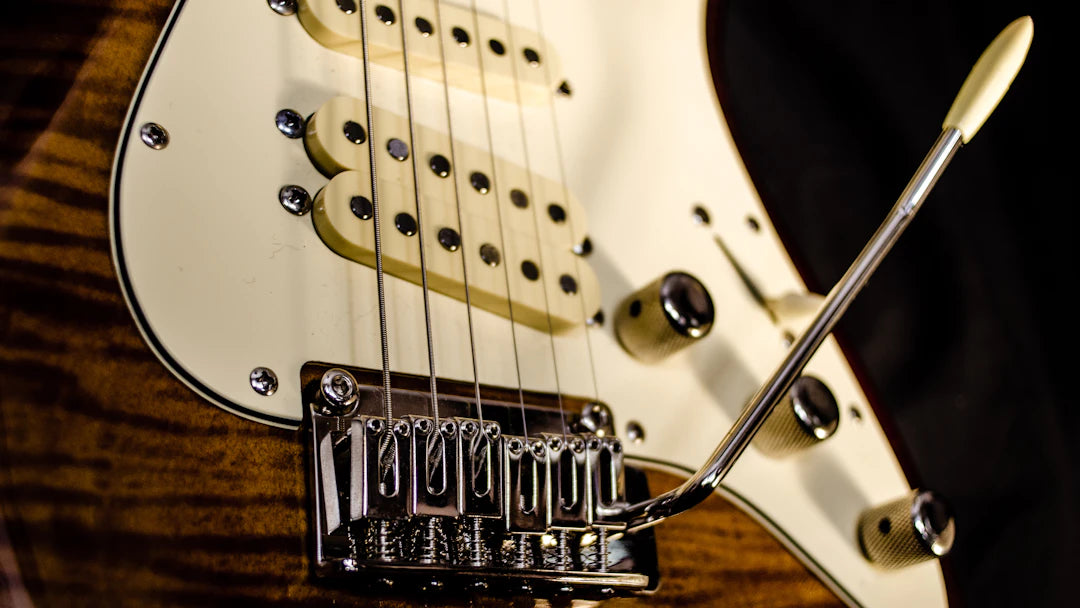Frequently Asked Questions
1. What are guitar pickups?
2. What are passive pickups?
3. What are active pickups?
4. How do I choose between active and passive pickups?
5. Can I modify my guitar's pickups?
If you’re a guitar enthusiast or a musician looking to upgrade your instrument, understanding the differences between active and passive pickups is crucial. The choice of pickups can significantly impact your sound, playability, and overall enjoyment of your guitar. In this guide, we’ll explore the nuances of active and passive pickups, their advantages and disadvantages, and help you determine which is right for you. Whether you play an electric guitar like the Odyssey Solaris Tele Fat Bridge SC or are considering some aftermarket oem guitar pickups, your pickup choice matters.
What Are Guitar Pickups?
Before we delve into the specifics of active and passive pickups, let’s clarify what guitar pickups are and their role in your instrument. Guitar pickups are electromagnetic devices that convert the vibrations of your guitar strings into electrical signals. These signals are then sent to an amplifier, allowing you to produce sound. The type of pickups you choose can affect everything from tonal clarity to the amount of noise your guitar picks up.
Understanding Passive Pickups
Passive pickups are the traditional type of pickups found in most electric guitars. They operate without any external power source and rely solely on the vibration of the strings to produce sound. Here’s a closer look at the characteristics that define passive pickups:
How Passive Pickups Work
Passive pickups use a combination of magnets and wire coils. When the strings vibrate, they disturb the magnetic field created by the magnets, generating an electrical signal. This signal is then sent to the output jack of the guitar and ultimately to the amplifier.
Advantages of Passive Pickups
- Natural Tone: Passive pickups tend to provide a warmer, more organic sound. Musicians often appreciate the dynamic range and character they bring to the instrument.
- Lower Noise Levels: Generally, passive pickups have less electronic interference and tend to be quieter than active ones, making them great for studio recordings.
- Wider Variety: There’s a broad range of passive pickups available in various designs, including single-coil and humbucker options, so musicians have plenty of choices to match their preferences.
Disadvantages of Passive Pickups
- Output Levels: Passive pickups often have lower output levels, which can require additional amplification, particularly for heavier genres.
- Feedback Issues: Since passive pickups are more sensitive to external noise, they may be prone to feedback in high-gain situations.
Diving into Active Pickups
Active pickups, on the other hand, use a built-in preamp powered by a battery. This feature significantly alters how they function and the sound they produce. Let’s break down the key aspects of active pickups:
How Active Pickups Work
Active pickups have a more complex design than passive ones. The internal preamp boosts the signal before it leaves the pickup, resulting in higher output levels and less interference. This setup allows for more consistent sound quality across various amplifiers and settings.
Advantages of Active Pickups
- Higher Output: Active pickups produce a stronger signal, which can drive amps harder and suit modern music styles that prefer tight, distorted sounds.
- Reduced Noise: The built-in preamp minimizes electronic interference, providing a cleaner signal, even at high gain settings.
- Enhanced Clarity: Active pickups excel at maintaining clarity and articulation, especially in complex, high-speed playing scenarios.
Disadvantages of Active Pickups
- Less Dynamic: Some players find that active pickups can sound less organic and responsive compared to the nuances of passive pickups.
- Battery Dependency: Since they require a battery, active pickups can pose an issue if the battery runs out during a performance, leading to an unexpected silence.
Which Is Right for You?
Deciding between active and passive pickups largely depends on your playing style, musical preferences, and the genres you’re most passionate about. Here are some considerations to help you make the best choice:
Musical Genre
Consider the genre of music you play. If you're into heavy metal or hard rock, the higher output and clarity of active pickups might serve your needs better. Conversely, if you enjoy blues, jazz, or classic rock, the warm and dynamic qualities of passive pickups can enhance your sound.
Playing Style
Your playing technique is also essential. If you use a lot of intricate picking patterns or fingerstyle, passive pickups may offer the nuances you're looking for. However, if you favor fast, aggressive strumming, active pickups will deliver the punch and clarity you need.
Consider Your Gear
Think about the gear you currently own. If you have a high-quality amp that provides enough headroom and dynamic range, passive pickups might shine. However, if you play through high-gain amps, active pickups can help maintain clarity while cutting through the mix.
Testing Your Pickups
If possible, the best way to determine which pickup system works for you is to test them out. Visit a music store or borrow guitars with both types of pickups. Pay attention to how each feels and sounds when you play your preferred style. Additionally, consider how different pickups interact with your amplification setup.
Common Misconceptions
When discussing active vs. passive pickups, several misconceptions arise that can cloud your judgment. Let’s address a few of them:
Active Pickups Are Only for Metal
While active pickups are favored in heavy genres for their clarity and output, they can be utilized in various styles, from pop to funk. Musicians often overlook the versatility that active pickups offer.
All Passive Pickups Are the Same
Another common myth is that all passive pickups produce a similar sound. In reality, there’s a wide variety of passive pickups, each with unique characteristics and tonal profiles. It’s essential to experiment rather than assume they’re all interchangeable.
Modifying Your Guitar
If you decide to change your pickups, you might also consider other modifications that enhance your guitar's performance. Upgrading to oem guitar pickups, for instance, can introduce new tonal flavors, making your sound richer. Consider the following options when modifying:
- Wiring and electronics: Upgrading your pots and capacitors can improve the overall signal quality.
- Strings: Choosing the right strings for your pickups can also affect the tone—experiment with thickness and material.
- Bridge and Nut: If you play an Odyssey Solaris Tele Fat Bridge SC, consider how the bridge type impacts sustain and resonance.
The Verdict: Making Your Choice
Ultimately, choosing between active and passive pickups is a personal journey. It’s about figuring out what resonates with you as a musician. Factors like genre, playing style, and personal preferences play a significant role in this decision.
Consider your guitar as more than just an instrument; it’s an extension of you as a musician. Whether you favor the vintage vibe of passive pickups or the modern clarity of active ones, be sure to explore your options thoroughly. An informed choice will lead to a richer playing experience that matches your unique sound.
Whether you're playing on stage, in your living room, or in the studio, the right guitar pickups can help you reach new heights of expression. Take your time to evaluate, experiment, and enjoy the process of discovering your perfect tone!
Visit one of our fellow Shopify or Wix users' stores by clicking this store link. Please note that this is a promotional link, and we are not responsible for the content of the linked store.











